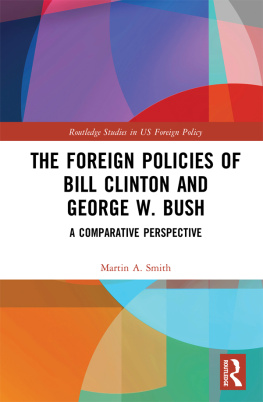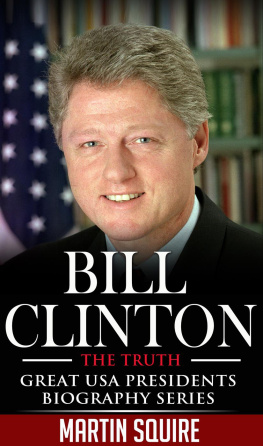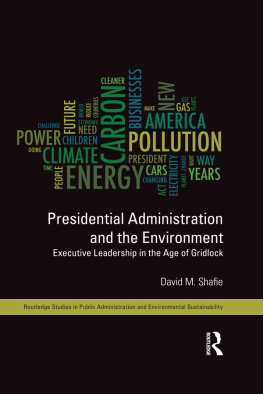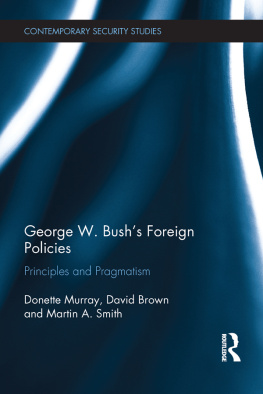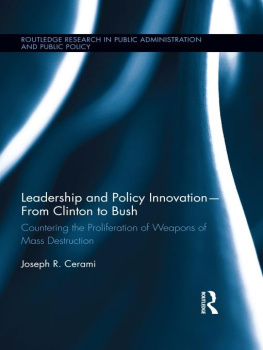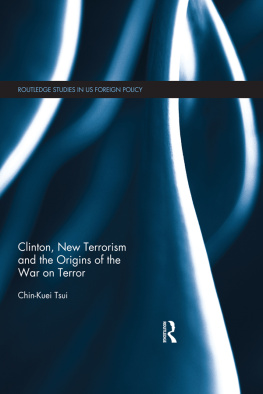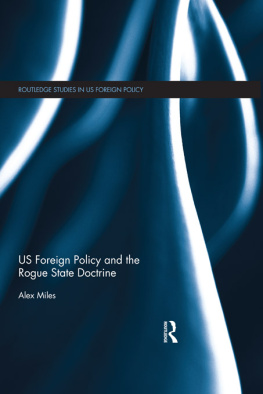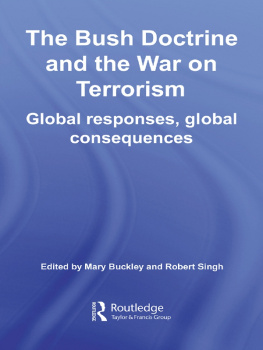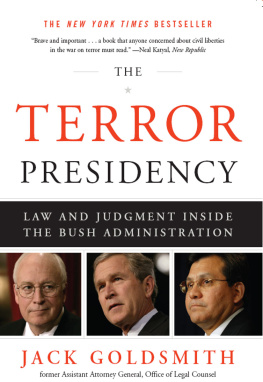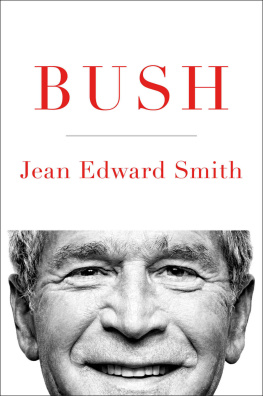The Foreign Policies of Bill Clinton and George W. Bush
This book offers a comparative analysis of the approaches, policies and records of the administrations of Bill Clinton and George W. Bush, through an examination of key foreign policy issues that caused controversy and debate both during the 1990s and in the years since 9/11.
In the post-9/11 security environment, three issues were identified by the Bush administration as being at the heart of a threat nexus issues that had also preoccupied the Clinton administration. These were the threats and challenges posed by international terrorism, particularly of the militant Islamist type; the so-called rogue states; and the US response to the actual and potential proliferation of weapons of mass destruction. Smith explores the responses to these issues and the debates surrounding the nature of US engagement with key regions and states, teasing out areas of similarity and difference in the policies and approaches of the Clinton and Bush administrations. Attention is also given to the contrast frequently drawn between Clintons alleged predilection for multilateral approaches to international relations and Bushs supposed hard-edged unilateralism.
This book will prove useful to scholars and students in the fields of US foreign policy, politics, international relations, security studies and public policy.
Martin A. Smith is Senior Lecturer in Defence and International Affairs at the Royal Military Academy Sandhurst. His main research interests are in the fields of international security, with a particular focus on international power; European security, with a particular focus on the postCold War evolution of NATO; and US foreign policy, with a particular focus on the presidencies of Bill Clinton and George W. Bush.
Routledge Studies in US Foreign Policy
Edited by Inderjeet Parmar
City University
John Dumbrell
University of Durham
This new series sets out to publish high-quality works by leading and emerging scholars critically engaging with United States foreign policy. The series welcomes a variety of approaches to the subject and draws on scholarship from international relations, security studies, international political economy, foreign policy analysis and contemporary international history.
Subjects covered include the role of administrations and institutions, the media, think tanks, ideologues and intellectuals, elites, transnational corporations, public opinion and pressure groups in shaping foreign policy; US relations with individual nations, with global regions and global institutions; and Americas evolving strategic and military policies.
The series aims to provide a range of books from individual research monographs and edited collections to textbooks and supplemental reading for scholars, researchers, policy analysts and students.
For a full list of titles in this series, please visit www.routledge.com/series/RSUSFP
Forthcoming titles
The Drug War in Latin America
Hegemony and Global Capitalism
William Avils
US Foreign Policy during the Cold War
The Horn of Africa from Colonialism to Terrorism
Donna Jackson
The Foreign Policies of Bill Clinton and George W. Bush
A Comparative Perspective
Martin A. Smith
Eleanor Roosevelt
Palestine, Israel and Human Rights
Geraldine Kidd
The Foreign Policies of Bill Clinton and George W. Bush
A Comparative Perspective
Martin A. Smith
First published 2018
by Routledge
2 Park Square, Milton Park, Abingdon, Oxon OX14 4RN
and by Routledge
711 Third Avenue, New York, NY 10017
Routledge is an imprint of the Taylor & Francis Group, an informa business
2018 Martin A. Smith
The right of Martin A. Smith to be identified as author of this work has been asserted by him in accordance with sections 77 and 78 of the Copyright, Designs and Patents Act 1988.
All rights reserved. No part of this book may be reprinted or reproduced or utilised in any form or by any electronic, mechanical, or other means, now known or hereafter invented, including photocopying and recording, or in any information storage or retrieval system, without permission in writing from the publishers.
Trademark notice: Product or corporate names may be trademarks or registered trademarks, and are used only for identification and explanation without intent to infringe.
British Library Cataloguing-in-Publication Data
A catalogue record for this book is available from the British Library
Library of Congress Cataloging-in-Publication Data
A catalog record for this book has been requested
ISBN: 978-0-415-43773-8 (hbk)
ISBN: 978-0-203-94605-3 (ebk)
Typeset in Times New Roman
by Apex CoVantage, LLC
ABC syndrome
In one of the first detailed evaluations of President George W. Bushs foreign policy published in 2003, Ivo Daalder and James Lindsay coined the moniker ABC Anything But Clinton to describe one of its major underlying drivers in their view.1 This pithy descriptor has endured, and the view that Bush and his senior advisers actively sought to differentiate themselves as far as possible from their predecessor, President Bill Clinton, has assumed the status of received wisdom.
Unsurprisingly perhaps, opponents of Bush have cited the allegedly distorting impact of this factor in criticizing his conduct of US foreign policy. In July 2005, for example, Congressman Gary Ackerman, a Democrat representative from New York, caustically charged, at a hearing of the House Committee on International Relations, that the Bush administration had made significant and damaging mistakes in the international arena owing in part to an engrained mentality that hating Bill Clinton was a substitute for foreign policy. This had led it, in Ackermans view, to repudiate virtually anything Clinton had done, regardless of whether or not this actually served US interests.2
Moreover, some of the Bush administrations own officials and staffers have recalled the influence of ABC syndrome amongst their former colleagues. Thus, Aaron David Miller, a long-serving State Department official who worked on Middle East issues under both Clinton and Bush, has written that Id been through several presidential transitions, but none so hostile and uncomfortable as the one from Clinton to Bush 43. It was ABC in spades. Clinton was seen by his successors, recalled Miller, as the incarnation of all that was morally corrupt, politically incompetent, and misguided on earth.3 Similarly, David Frum, an early-term member of Bushs speechwriting team, has described how the new president intentionally set out to be as Un-Clinton as possible in every aspect of his presidency: from punctuality in starting meetings, through standards of individual probity and morality, to the formulation and implementation of policy.4
Foreign officials who worked closely with their opposite numbers in the Bush administration were also sometimes struck by the sense of engrained antipathy to Clinton and all he was perceived to stand for. Then British Ambassador to Washington Sir Christopher Meyer, for example, was in regular contact with senior Bush administration officials during the first two years of his presidency. Meyer later recalled that sometimes one felt in those early days that being the anti-Clinton was what animated the Bushies most.5

